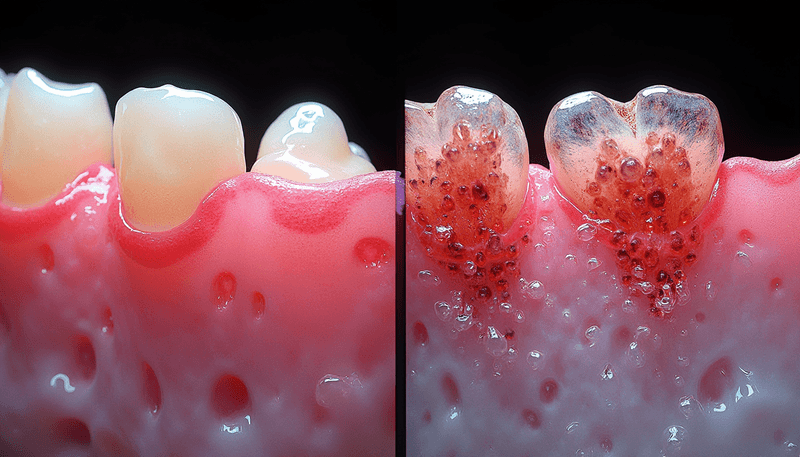Progesterone's Two Faces in Gum Health

That tingling sensation in your gums might be telling you more about your hormonal health than you realize. As a women's health advocate for over 15 years, I've seen countless patients surprised by the unexpected connection between their hormone therapy and oral health. A groundbreaking study reveals the complex relationship between progesterone and gum health in perimenopausal women, and the findings might change how you think about your dental care routine.
The Hidden Impact of Professional Dental Cleaning
Let's start with what might be the most eye-opening finding: when it comes to progesterone's effects on your gums, timing is everything. Professional dental cleaning, known as scaling and root planing (SRP), completely changes how progesterone interacts with your gum tissue.
Think of your gums like a garden. Without proper maintenance (SRP), adding progesterone is like watering weeds – it can actually make inflammation worse. But in a well-maintained garden (after SRP), that same progesterone acts more like a nutrient-rich fertilizer, supporting healthy tissue.
Did you know that 52.6% of perimenopausal women experience moderate to severe gum problems? It's not just you dealing with this challenge.
Understanding the Inflammation Connection
Here's where things get fascinating. The research showed that progesterone actually behaves differently depending on the state of your gums. Without professional cleaning, it can increase three key markers of inflammation: C-reactive protein (CRP), interleukin-6 (IL-6), and tumor necrosis factor-alpha (TNF-α).
Picture your immune system as a security team. These inflammatory markers are like security guards. When there's bacterial buildup on your teeth, progesterone can make these guards overreact, leading to more inflammation. However, after a thorough professional cleaning, progesterone helps these same guards maintain a more balanced response.
What steps are you taking to coordinate your hormone therapy with your dental care? The timing could make all the difference.
The Six-Month Window of Opportunity
One of the most practical findings from this research is the timing aspect. The effects of progesterone on gum health – whether positive or negative – lasted about six months. This creates a clear window of opportunity for taking action.
Here's what this means for your health routine:
- Schedule professional dental cleanings every six months
- Time your cleanings to align with the start of hormone therapy when possible
- Monitor your gum health more closely during the first six months of progesterone treatment
- Pay attention to any changes in gum sensitivity or bleeding
Consider this: When was your last professional dental cleaning? If it's been more than six months, you might not be getting the full benefits of your hormone therapy.
Throughout my practice, I've seen how this knowledge can transform outcomes. Sarah, one of my patients, had been struggling with persistent gum inflammation despite being on progesterone therapy. After adjusting her dental cleaning schedule to align with her hormone treatments, she saw significant improvements within months.
Key Action Steps:
- Talk to both your dentist and hormone specialist about coordinating care
- Keep a monthly log of any gum changes you notice
- Don't skip professional cleanings, especially when on hormone therapy
Your journey through perimenopause doesn't have to include compromised oral health. By understanding this research and implementing its findings, you can make informed decisions about your healthcare routine. Start by scheduling that dental appointment you might have been putting off – your gums will thank you for it.
Take Action Today: Look at your calendar right now and check when you last had a professional dental cleaning. If it's approaching or past six months, make that appointment. Your oral health is an integral part of your perimenopausal journey, and you have the power to optimize both your hormone therapy and dental care for the best possible outcomes.

Dr. Marcus Anthony Bennett
Dr. Marcus Bennett is a Seattle-based freelance medical writer and consultant specializing in mid-aged women's health. With a background in internal medicine and over a decade of experience in preventive care, he is dedicated to making complex health topics accessible. Dr. Bennett completed his MD at Johns Hopkins School of Medicine and residency at the University of Washington. His empathetic and evidence-based approach combines traditional medical expertise with a focus on health disparities, often incorporating practical lifestyle advice. Known for his clear, engaging communication, Dr. Bennett provides actionable insights to empower his audience.






